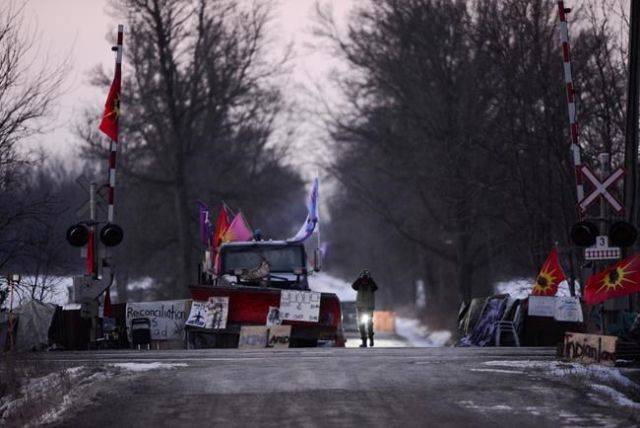
Police give Tyendinaga Mohawk protesters deadline to clear out
Protesters were reportedly given until the end of Sunday night to clear a blockade on Tyendinaga Mohawk Territory that’s crippled the country’s rail network.
Ontario Provincial Police and Canadian National informed protesters that they will face an investigation and possible charges if they don’t clear the tracks in eastern Ontario by 11:59 p.m. on Sunday, according to multiple media reports.
The barricade has shut down train traffic along a key corridor for more than two weeks.
CN declined to comment on the reported move, and spokespeople with the OPP did not immediately respond.
The barricades are a response to a move by the RCMP to clear protesters who had been blocking access to a pipeline worksite on Wet’suwet’en territory in northern British Columbia.
Hereditary chiefs of the Wet’suwet’en Nation oppose the work on their traditional territory, despite support from elected band councils along the pipeline route.
On Friday, Prime Minister Justin Trudeau said it was time for the barricades to come down and injunctions ordering the tracks cleared to be enforced.
But Heredity Chief Na’moks, also known as John Ridsdale, said Sunday that Trudeau’s “misinformed” and “antagonistic” speech had the opposite effect.
“If the prime minister had not made that speech the Mohawks would have taken down everything,” he said. “They were ready. We were on the phone.”
More rail-line protests sprung up over the weekend, even after Trudeau’s stern words.
In Vancouver, protesters returned to the site of CN Rail tracks on the city’s east side, but police spokesman Sgt. Aaron Roed said the gathering appeared to be a continuation of protests over the past few weeks.
He said about 40 people were off to the side of the tracks, not blocking rail lines, and officers had informed them of an injunction already in place.
Na’moks said all five hereditary chiefs are expected to meet in northern B.C. on Monday to plan their next steps and talks with the RCMP could resume on Thursday at the earliest.
He said the chiefs will not budge from their demands for the Mounties to remove every component of a mobile unit from the 29-kilometre mark from Highway 16 before meeting with them.
“The local constabulary can look after the patrols,” Na’moks said of a detachment in nearby Houston. “The officers that they fly in and out on a seven-day basis is what we want gone from the territory.”
Dawn Roberts, a spokeswoman for the RCMP, said the mobile unit has been temporarily closed as discussions are underway with the deputy commissioner about its future.
“This means that the buildings have been locked and secured and that the gates and the fence that’s around that property has been locked,” she said.
Officers who were stationed at the unit are now conducting patrols of the area from the Houston detachment, about 40 minutes away, Roberts said, adding she is not aware of any plans by Mounties to meet with the chiefs on Thursday.
The chiefs visited supporters this week in Tyendinaga and Kahnawake south of Montreal, and repeated that their conditions for talks to begin have not been met.
Chief Woos, of the Grizzly House, told reporters in Kahnawake on Saturday that attempts to reach out to Indigenous Services Minister Marc Miller have not been returned since Trudeau’s announcement on Friday.
“It seems to me like ever since Mr. Trudeau has made his announcement, the communication has ceased,” Woos said.
But senior cabinet ministers said Sunday the federal government remained ready to talk.
Speaking Sunday on Global’s news and political affairs series “The West Block,” the minister for Crown-Indigenous relations styled conversations as productive and that all sides were making good progress.
Carolyn Bennett said that “at no time have we stopped negotiations.”
She added later in the interview that “keeping the conversation open” along with the removal of the RCMP from the Wet’suwet’en territory are “really important criteria to getting us through this difficult patch and on to a good path.”
She said there are differing opinions within the Wet’suwet’en Nation, and it is the nation itself that has to sort out the divide.
“Within the Wet’suwet’en community that there are differing opinions and matriarchs, there are people that are speaking up about their issues as well,” Bennett told the program.
“The solution will be found in the Wet’suwet’en community as they come together with their vision of self-determination and how they can form a government and write their own laws.”
On CTV’s “Question Period,” Public Safety Minister Bill Blair said the barricades needed to come down and that the federal government is committed to dialogue. He urged the hereditary chiefs to come back to the table.
“We all understand the importance of a peaceful resolution, but a speedy resolution, because the impact of these barricades is unacceptable, untenable,” Blair said.
“It can’t be maintained because of the harm that it is causing and so we have confidence in the police to do the job peaceably.”
He said that it was the responsibility of the police in each jurisdiction to deal with the blockades and was cool to the idea of the federal government sending in the military to forcibly remove demonstrators.


